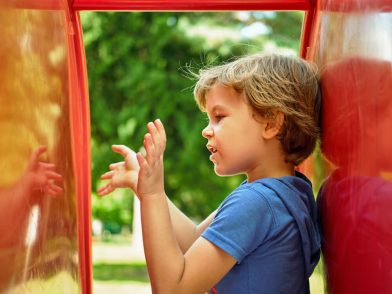Guide to Baby’s First Steps: When Do Babies Start Walking?
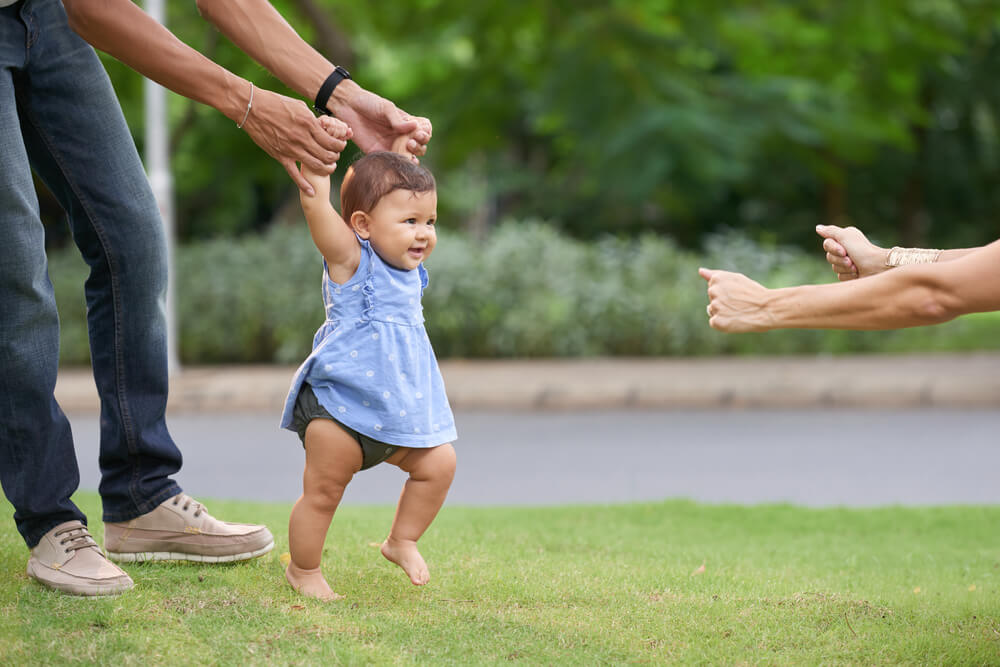
It’s one of the most exciting milestones your baby will hit: learning to walk and taking their first steps. But exactly when can you expect your little one to start walking, and what’s the best way to encourage them to walk independently?
If you’re anticipating the signs that your baby is about to meet this major milestone, then we’ve got all the information you need, including what to do and not do, clues that walking is imminent, and when to consult a doctor. Let’s dive in!
Contents:
- When Do Babies Start Walking?
- What are the Signs My Baby Will Walk Soon?
- How Can I Encourage My Baby to Walk?
- Baby Proofing Ready for Baby to Walk
- Baby Products for Walking
- What is Toe Walking?
- When Should My Baby Start to Wear Shoes?
- Developmental Delays with Walking — When to See a Doctor?
- FAQs
When Do Babies Start Walking?
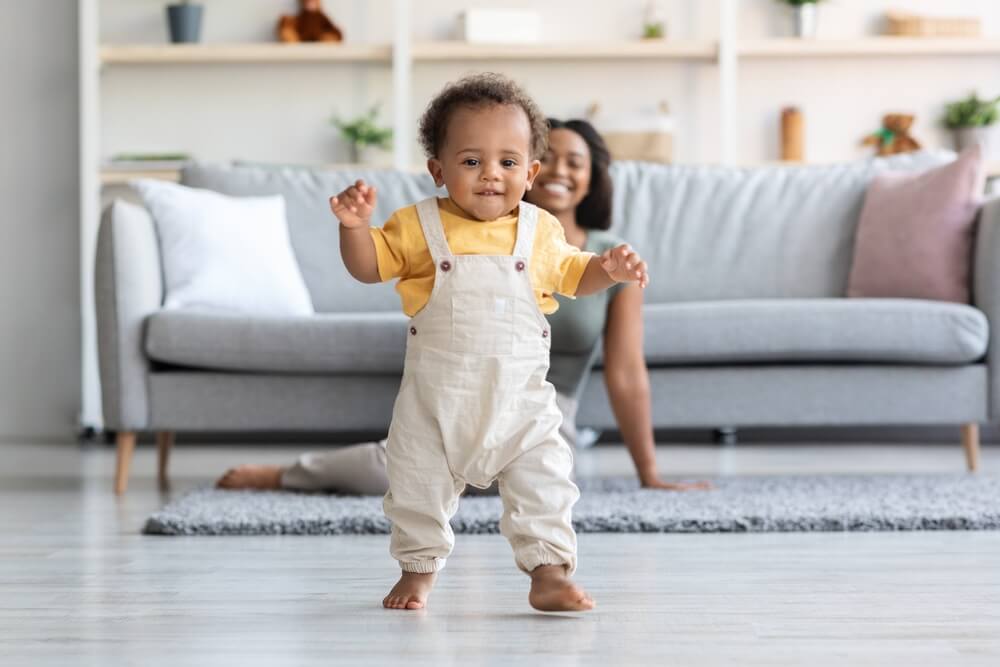
Prostock-studio/Shutterstock.com
Typically, babies start walking between twelve and eighteen months. However, it’s important to remember that this is an average; some babies may start walking as early as seven months, while others may take their first steps a little later.
Reasons for Late Walking in Babies
Babies that aren’t walking by the age of eighteen months are considered late walkers. There are a number of reasons that can cause this. These include prematurity or low birth weight, genetic conditions, neuromuscular conditions or physical conditions, or prolonged hospitalization or illness.
Late walking could simply be down to your kid’s unique personality: some babies are naturally more cautious than others, and these little ones may need a little more encouragement and support when it comes to learning to stand and walk.
What are the Signs My Baby Will Walk Soon?
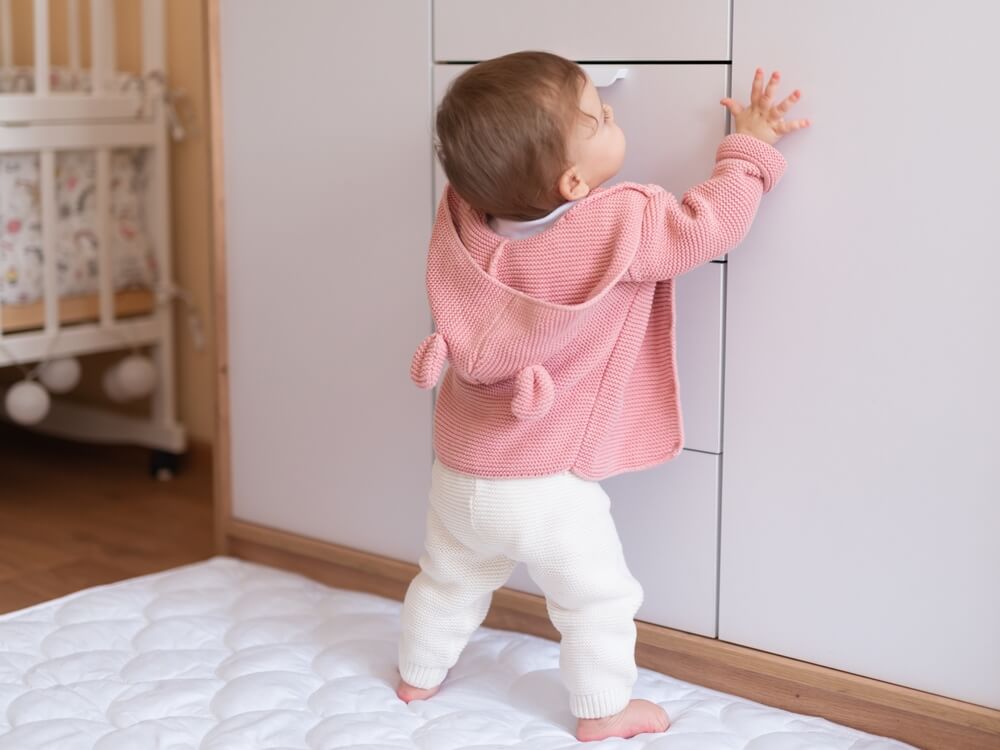
Razbitnov/Shutterstock.com
This is such an exciting time: learning to walk is a major milestone, and parents are keen to look out for the signs their baby will walk soon. But what are these signs?
Here are the clues that your little one could be walking soon:
- Baby is pulling themselves up to a stand using furniture.
- They are generally more adventurous—this confidence is crucial when it comes to taking those first steps.
- They’ve started cruising around, by holding onto something as they take steps.
- Standing up without support.
Another sign that might catch you off guard is sudden night waking when they have been sleeping through, or a change in sleep pattern. Often, right before a major developmental leap, babies can experience disturbed sleep—very frustrating when you’ve formerly been enjoying an uninterrupted eight-hour nightly rest. So if your baby is suddenly waking in the night again for no apparent reason, get ready: it could be nearly walking time!
Wondering about where crawling fits in the scheme of things? While many babies crawl before they start walking, some skip this stage entirely or go from commando crawling (pulling themselves along on their tummy) to walking. The main milestone, when it comes to walking independently, is learning to pull themselves up to a complete stand.
Creeping and Crawling
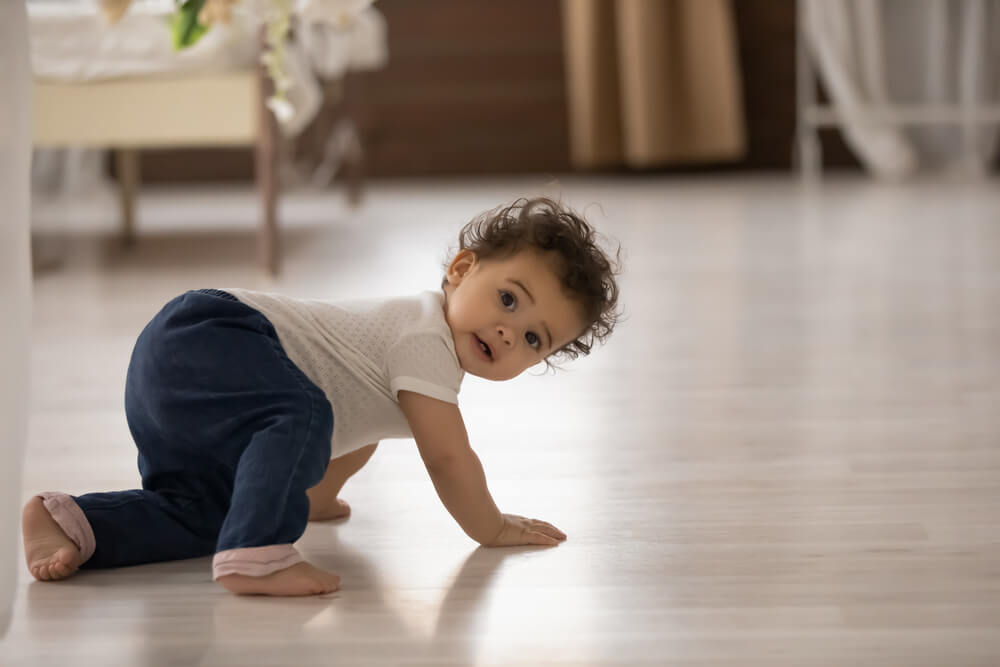
fizkes/Shutterstock.com
Although some babies miss out on the crawling stage and go straight to walking, many others don’t. Crawling tends to happen around the seven to nine months mark; it’s where a baby uses their arms and legs to propel themselves forward, keeping their tummy on the ground.
After crawling usually comes the creeping stage. Creeping involves a baby moving around without their tummy being in contact with the floor. It occurs when a baby is able to put their full weight on their hands and knees. As well as being a sign of amazing muscle and coordination development, creeping gives them a whole new perspective on the world. And it’s this curiosity that’s often the catalyst to attempts to pull up and walk.
Before fully-fledged independent walking, many babies go through a cruising phase, where they stand and holding onto various pieces of furniture, move about the room.
How Can I Encourage My Baby to Walk?
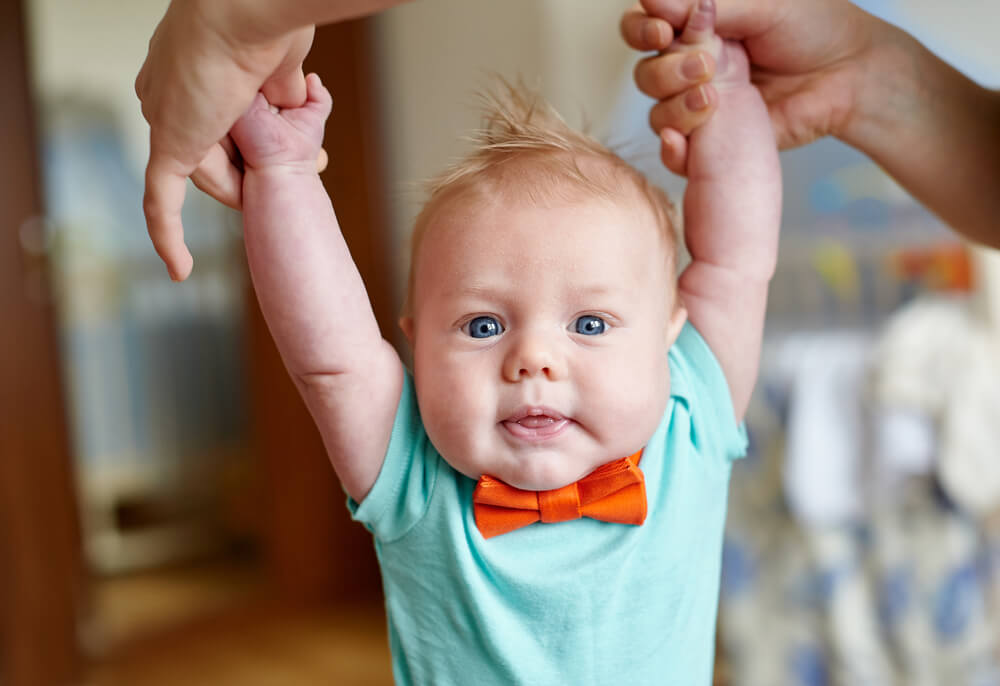
Tymonko Galyna/Shutterstock.com
Now you know roughly when you can expect your baby to start walking, it’s time to consider some ways to help them learn! After all, taking your first steps is a tricky business.
Tummy Time
Encourage your baby to spend time on their tummy to strengthen their neck, back, and arm muscles, which are essential for crawling and eventually walking.
Watch Out for Cues
You’ll usually see some clues that your baby is about to start walking, such as those we’ve discussed above. When you see them, offer plenty of encouragement, and praise your little one every time they attempt a step and every achievement.
Offer a Helping Hand
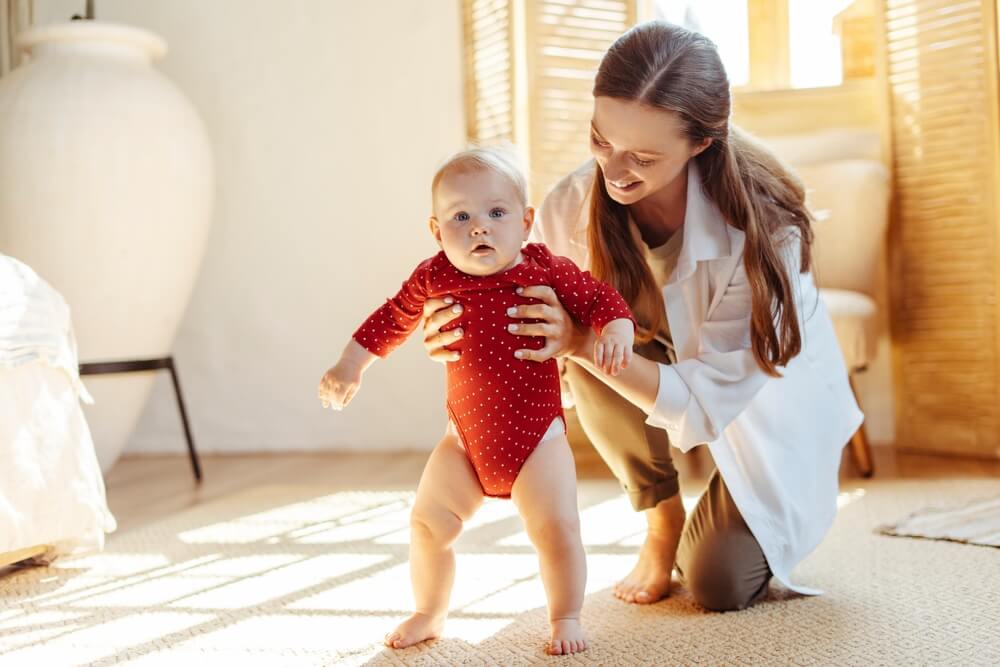
AYO Production/Shutterstock.com
Standing or crouching just a few steps away from your baby, extend your hand and encourage them to walk to you. Once they’re confidently walking a few steps independently, move a little further away. You could also use a favorite toy to encourage your baby to take just a few more of those steps!
Supportive Environment
Create a safe and open space for your baby to practice walking, such as a clear area on the floor. Remove any obstacles or hazards that could impede their progress.
Use of Toys
Place toys just out of reach to encourage your baby to crawl or cruise along furniture to reach them. This motivates them to move and explore their surroundings.
Challenge Them
Once your baby has gotten the hang of walking on flat surfaces, it’s time to challenge them by helping them master more uneven surfaces. Always ensure, however, that this is a safe surface, such as a ramp.
Make it Fun!
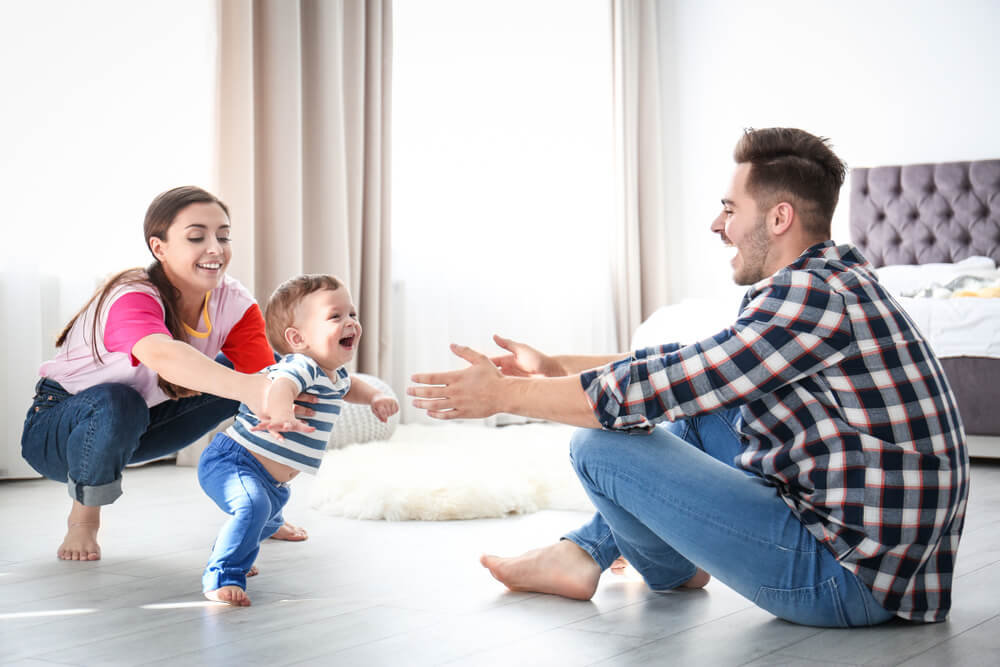
New Africa/Shutterstock.com
We get it: watching your baby trying to take their first steps can be nerve-wracking—you don’t want them to fall. But keeping things light-hearted and fun is the best way to make the whole activity an enjoyable experience—and one that your little one will want to repeat again and again.
Encouragement and Positive Reinforcement
Praise and encourage your baby as they attempt to walk, even if it’s just a few steps. Positive reinforcement boosts their confidence and motivates them to keep trying.
Offer Comfort After a Fall
It’s normal for babies to frequently take a fall or tumble when they start walking, so be quick to offer a hug and consolation when these occur. It’s important to baby-proof your house, to ensure that regular falls don’t have the potential to turn into something more serious. Adding corner guards to tables and other items of furniture is an example of how to prevent this.
Your child is growing up not by days, but by hours! The next developmental milestones will imply increasing independence and detachment from parents. To worry less about your child and ensure their safety in any circumstances, use the Findmykids app!
Baby Proofing Ready for Baby to Walk
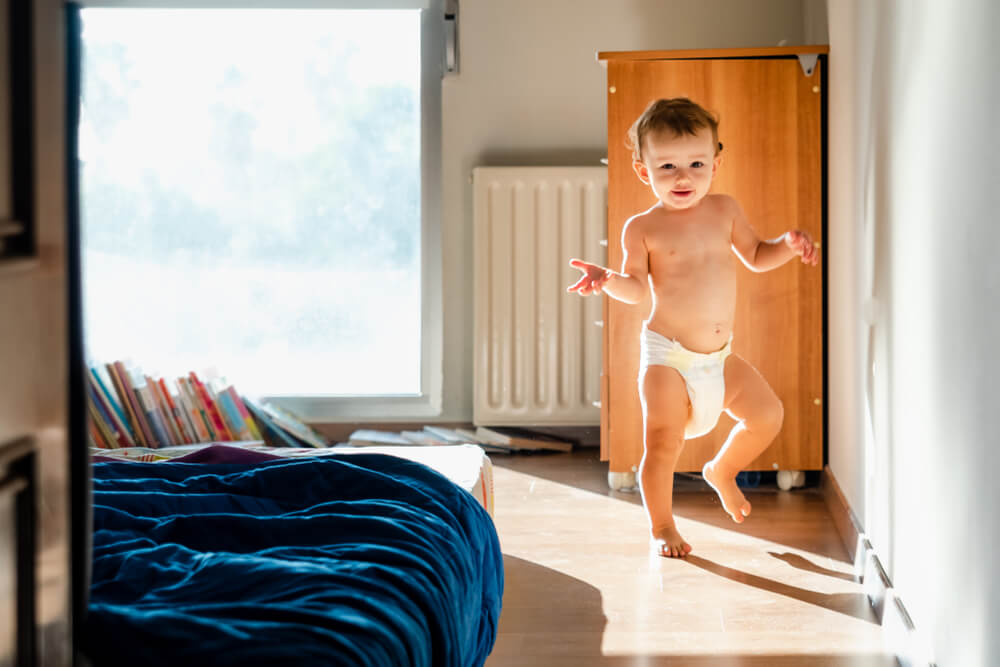
Joaquin Corbalan P/Shutterstock.com
Before your baby starts learning to walk—and becomes an explorer par excellence—you’ll need to babyproof your home to help keep them safe from injuries. Start by ensuring floors are free from clutter and trip hazards, such as wires. Fragile items should definitely be moved out of harm’s way at this point in your child’s development! And don’t forget to cover electricity outlets.
If it’s not possible to babyproof your entire house, consider gating off a safe space or blocking access to certain rooms that are more hazardous (such as the kitchen), so that your baby can learn to walk safely.
Baby Products for Walking
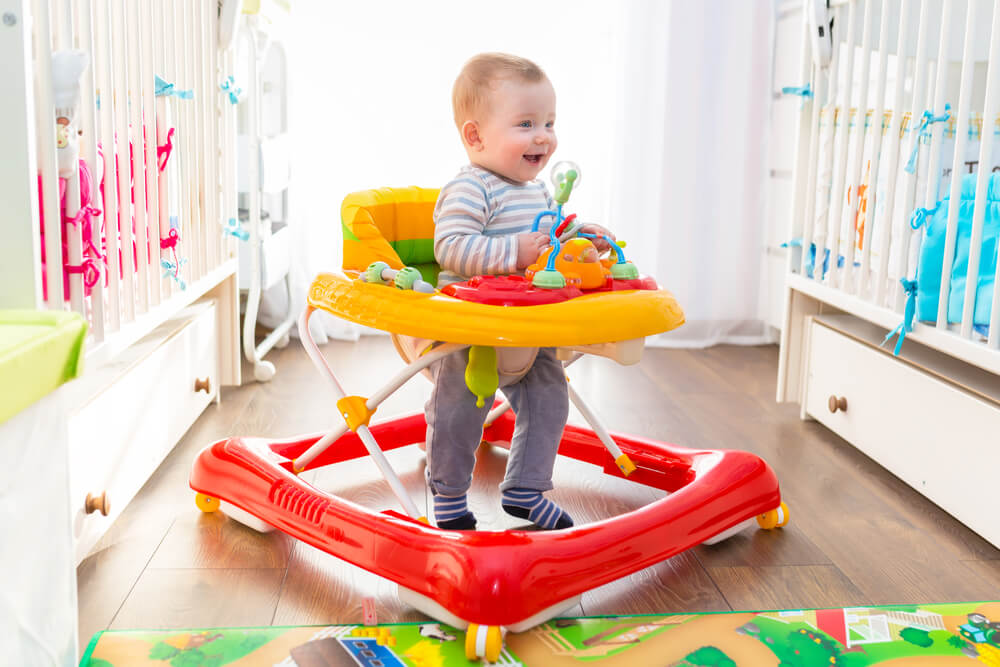
Patryk Kosmider/Shutterstock.com
As well as wondering when do babies start walking, you may also be interested in the products available that purport to help very young children meet this important milestone. There are lots of baby push toys, which can be great for building confidence: babies can hold on to these toys as they navigate around a room without the help of mom or dad.
You’ll find a huge range of push toys on the market, from simple models to ones featuring a host of interactive elements.
Pros of Baby Walking Toys
- Helps build confidence.
- Enables babies to get to grips with the fundaments of walking.
- Enhances balance and spatial awareness.
- Encourages exploration.
- Offers entertainment.
Cons of Baby Walking Toys
- They may result in a delay in independent walking.
- Have been associated with a higher risk of falls or injury than learning to walk independently.
- If a baby isn’t developmentally ready, they may become frustrated or upset trying to use a push or walking toy.
- Parents may be tempted to leave their baby unsupervised, especially in push toys that can be sat in—this should never be done, even for a short period.
If you do choose to use a baby walking toy, bear in mind that it shouldn’t be used for long periods. Healthcare experts recommend walking toys should not be used for more than twenty minutes at a time. It’s also vital to supervise your baby using these toys at all times and to ensure there are no obstacles in their path.
What is Toe Walking?

Onjira Leibe/Shutterstock.com
Toe walking is a normal occurrence in children learning to walk. It’s when a child walks on the balls of their feet and their toes without their heels touching the ground. It usually stops once a child is two years old but, in some cases, it goes on for longer than this. If your little one is still toe-walking after their second year, it’s important to talk with your healthcare provider as it may signal an underlying medical condition.
In many cases, the causes of toe walking beyond two are unknown. It may be caused by a shortened Achilles tendon, or could have simply started some time ago and now developed into a habit. In rare cases, it’s associated with a brain, muscle, or nerve disorder, a spinal cord abnormality, or an autism spectrum disorder.
When Should My Baby Start to Wear Shoes?

Monkey Business Images/Shutterstock.com
The next of the walking stages is the first pair of shoes—and this is another momentous, photo-worthy event for parents! But when should your baby start wearing shoes for the first time?
You may be surprised to learn that babies shouldn’t start wearing shoes until they’re confident, established walkers. Wearing shoes can actually hinder a baby’s attempts to walk, as they can restrict natural foot movement. Barefoot is best when it comes to learning to walk.
And once your baby has mastered this walking business? Be sure to choose shoes that fit well, and are flexible and lightweight. Choosing shoes with non-skid soles is also important.
What Kind of Shoes Are Best for Babies Learning to Walk?
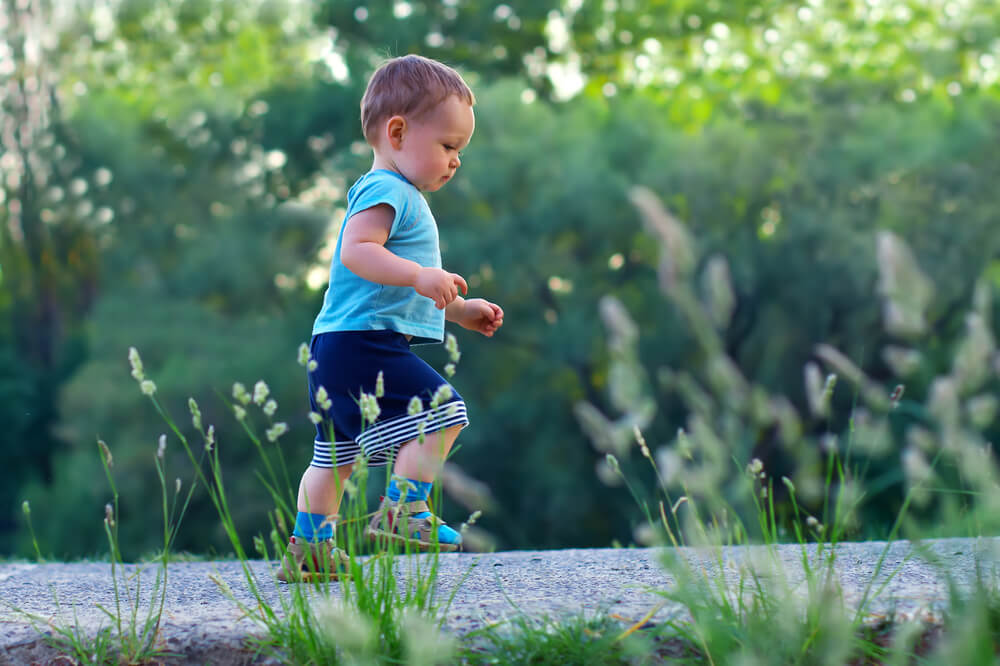
Olesia Bilkei/Shutterstock.com
As we talked about, it’s best for babies learning to walk to do so barefoot. However, if you’re worried about your little one’s feet getting chilly, popping on a pair of booties or socks is the best idea. Once your baby is stepping with confidence, then opt for properly fitting, breathable shoes with soft, flexible soles and good ankle support for wearing outdoors.
Here are some tips for choosing the best shoes:
- Soft, Flexible Material: Look for shoes made from soft, flexible materials like breathable canvas or leather. This allows for natural foot movement and helps your baby feel the ground beneath them, which is essential for developing balance and coordination.
- Room to Grow: Select shoes with a wide toe box and a roomy fit to accommodate your baby’s growing feet. Avoid shoes that are too tight or restrictive, as they can interfere with proper foot development.
- Lightweight and Low Profile: Opt for lightweight shoes with a low profile to minimize interference with your baby’s natural gait and movement. Bulky or heavy shoes can hinder walking progress and increase the risk of trips and falls.
- Non-Slip Soles: Choose shoes with non-slip or grippy soles to provide traction and stability, especially on smooth or slippery surfaces. This helps prevent slips and falls while your baby is learning to walk.
- Adjustable Closure: Consider shoes with adjustable closures like Velcro straps or elastic laces for a secure fit that’s easy to put on and take off. Avoid shoes with laces or buckles that can be difficult to manage.
- Supportive Heel Counter: Look for shoes with a firm, supportive heel counter to provide stability and prevent excessive rolling of the ankle. However, the shoe should still allow for natural movement of the foot.
- Breathable and Moisture-Wicking: Choose shoes with breathable linings or moisture-wicking properties to keep your baby’s feet dry and comfortable, reducing the risk of irritation or chafing.
Remember that barefoot walking is best for indoor environments whenever possible, as it allows your baby’s feet to develop naturally and strengthens the muscles and ligaments of the foot. Shoes should only be worn when protection is needed, such as outdoors or on rough surfaces.
Developmental Delays with Walking — When to See a Doctor?

Monkey Business Images/Shutterstock.com
Babies hit milestones at different times; while some babies may start pulling themselves up on furniture and trying to walk at just seven months old, others may not take their first independent steps until their eighteenth month.
If your child isn’t walking by eighteen months old, it’s important to consult your healthcare professional, as there could be an underlying medical issue causing the delay. Some of the reasons behind delayed walking include:
- Neurological disorders such as Down syndrome or cerebral palsy.
- Muscular dystrophy or other muscular issues.
- Vitamin D deficiency.
- Rickets.
- Hyperthyroidism.
- Hypotonia.
- Learning disabilities may sometimes cause a delay in walking.
Other things that may cause delayed walking include familial maturation delay (where one or both parents have a family history of delayed walking), prematurity—or simply a lack of confidence. Linked to the latter, babies who are carried everywhere and not given ample opportunity to practice pulling themselves up and taking steps could experience a delay in learning to walk.
Moving on Up: Getting Ready for Your Baby to Take His First Steps
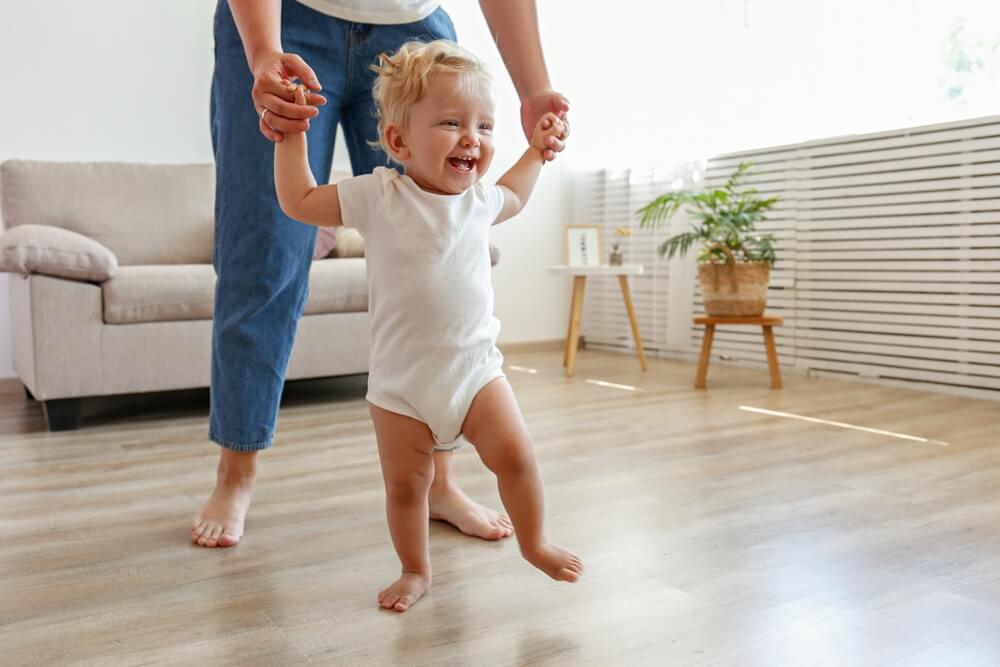
evrymmnt/Shutterstock.com
Whether you’re expecting, have a newborn, or your baby is coming up to the one-year mark you may be wondering when they’ll take their first steps. For many parents, it’s reassuring to know that there can be quite a range between when it’s considered ‘normal’ for a baby to walk.
Although some babies are just seven months old when they take their first steps, the average is between twelve and eighteen months. This may put your mind at rest if your friend’s fourteen-month-old baby has been walking independently for a while, while your twelve-month-old has only just started pulling herself up to standing.
Use the guide above to help encourage your little one to start walking—after all, trusting your wobbly legs for the very first time takes some bravery! And be sure to speak with your healthcare provider if you have any concerns, or if your baby is not walking by eighteen-months-old.
Do you have a child who is already walking? At what age did they take their first steps? And were there any specific things you did to help encourage them that worked really well? We’d love to hear your first-steps stories—drop us a line in the comments box below!
FAQs
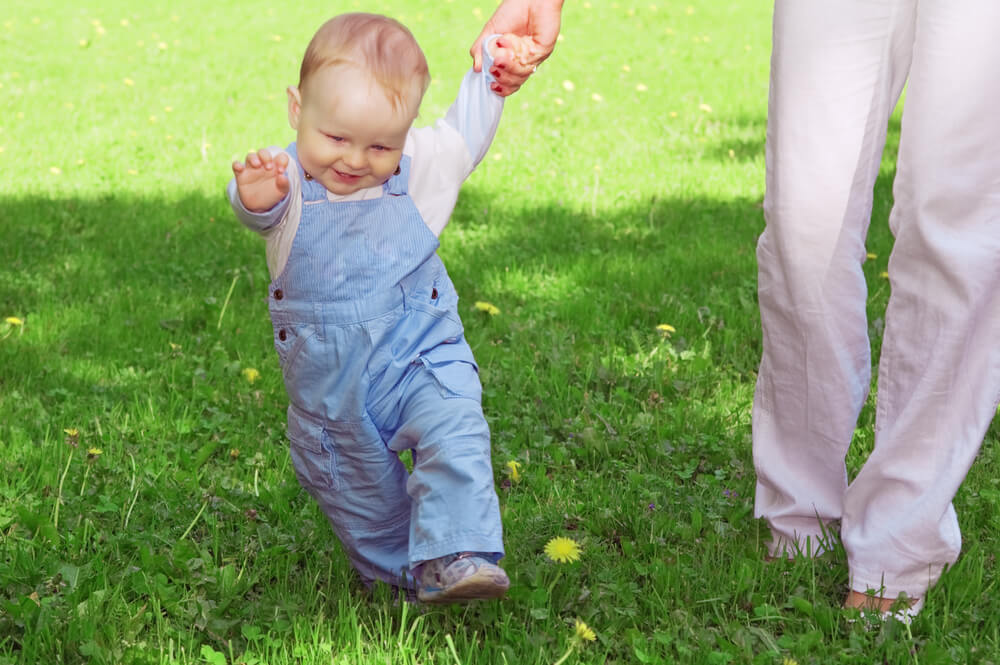
Igor Sokolov (breeze)/Shutterstock.com
What is the normal age for a baby to start walking?
Most babies start walking between the ages of twelve and eighteen months. However, some babies learn to walk earlier and may take their first independent steps at just seven months. Advice from a healthcare professional should be sought if your baby isn’t walking by eighteen months, as this could signal an underlying issue.
What is the youngest baby to walk?
One of the youngest babies on record to walk did so at just eight weeks old! Of course, this is exceptionally rare: around seven months is generally the earliest you can expect your baby to take his first independent steps.
When should I worry about the baby not walking?
Babies hit milestones at different ages; however, if your baby isn’t walking by eighteen months, you should seek advice from your healthcare provider.
How do I encourage my baby to walk?
Providing lots of praise and encouragement for every attempt and offering plenty of comfort when falls occur are some of the best ways to encourage your baby to start to walk. Extending your hands and asking your baby to walk to you is also often effective. Once your baby is walking confidently on flat surfaces, give them some (safe) practice walking on uneven ground, such as a ramp.
The picture on the front page: Dragon Images/Shutterstock.com
Проверьте электронный ящик














